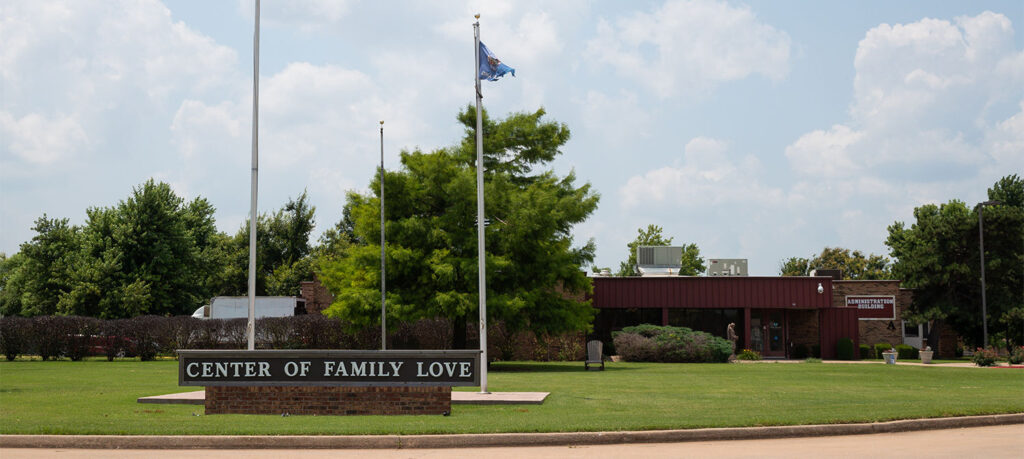

Residents find ways to express themselves and live freely at a community-minded organization supported by the Noble Foundation.
Wheat fields wrap around the Center of Family Love in Okarche, Oklahoma, a tiny rural town famous for its fried chicken. In this quiet farming community, adults with disabilities are doing what few thought possible: living independently, growing freely, and pursuing self-discovery through art and agriculture.
“Center of Family Love wraps people in love,” says Marsha Smith, Center of Family Love vice president of program services. Feeling at home in a small town with a big heart wasn’t so much by discovery but by design, she says. “The community wraps us in love, and that makes it the ideal place to thrive.”

The Center of Family Love (CFL) is home to 130 adults with intellectual, developmental and physical disabilities. The campus offers two levels of living: group homes for those who can live with greater independence and intermediate care for those with greater medical needs. Residents can work at local manufacturing sites, a recycling center, or in the campus gardens or gift shop. They go to the movies and the bowling alley, they shop and see parades, and they engage in on-site education.
The center was founded 40 years ago by families of children with disabilities. These families had their minds on the future of their loved ones. Historically, adults with disabilities have only a few options after high school. They can go to state institutions, receive costly private care, or live at home with family for the remainder of their adult lives. CFL offers another option: residency to people near and far at no cost. It is the only residency center of its kind that includes specialized disabled geriatric care, and its approach has proven to provide residents with full, meaningful lives that often extend beyond the prognoses of doctors. The eldest resident is in their 90s, a testament to the power of holistic living.
“Our residents have a purpose, and it’s up to us to help them discover that,” says Nellie Sanders, CFL vice president of philanthropy.

CFL is funded primarily through Medicare and Medicaid, but also through donations from people and organizations like The Samuel Roberts Noble Foundation. Donations allow CFL to live out its goal of shifting from a medical model — providing basic medical care like a nursing home — to an educational model that expands the lives of residents through transportation, therapy and vocational programs.
The Noble Foundation has awarded $591,000 to CFL since 1978. A 2020 grant for $50,000 funded operations, and a 2019 grant for $100,000 supported a pilot program for the arts and gardening. Noble employees designed hoop houses and advised CFL through the program launch, sharing knowledge on vegetable selection and soil care.
“Bringing horticulture projects to Center of Family Love provided valuable training opportunities for residents and enhanced their gardening skills,” says Stacy Newman, Noble Foundation director of philanthropy. “Center of Family Love is a place where residents can grow independently in every way possible.”

The hoop houses are hot and quiet, a silent retreat in the middle of a bustling campus.
“This is the place I want to go after a long day; it’s so peaceful,” Sanders says. “It’s a place for everyone to garden.”

Raised beds are compliant with the Americans with Disabilities Act (ADA), with adaptations for watering and harvesting. Peppers and herbs become pesto during a cooking class for local students, and the lettuce is used in salads prepared by residents.
“The investment the Noble Foundation made in us was the impetus that propelled us to grow and cook our own vegetables. Now, residents have pride when that tomato comes,” says Debbie Espinosa, CFL executive director. “Everyone wants goals and ambitions, to go to work every day and get paid for it. Everyone wants independence, and everyone has so much love to give.”
Horticulture created roles for residents who otherwise could not work due to physical, sensory or verbal challenges. Garden perimeters are lined with bright marigolds tended by a person with profound autism. The resident came to CFL non-verbal, often rocking intensely and disengaged, his mobility restricted. After a visit to the hoop house, he started pulling weeds as if he had been gardening his whole life.

“With every new thing we introduce, we discover something new in our residents,” Sanders says. “You see them add their own flair to things. The gardening program helped us discover a sense of who they are.”
Limitations are not defined by diagnoses and caretakers, Smith says. Residents make their own way and expand their lives on their own terms — often taking CFL to places and ideas never before considered. Cultivating produce inspired healthy eating, which inspired cooking classes, fitness classes and adaptive exercises. For every program introduced and implemented, many more are inspired by residents’ interests.

Now residents are dreaming bigger for their campus.
As a result of the new programs funded by Noble, CFL is looking to add another building: the Newfield Community and Education Center.
“We need more room and extra support to discover who God intended us to be. We need a building made just for us,” says Tanner B., a new resident, dressed in a suit to emcee CFL’s 40th birthday party, a virtual fundraising event.
Tanner is hoping the fundraiser will bring in $1 million for the new building. Together, architects and residents designed the union-style hub for socialization at all levels and needs. It will house a swimming pool, expanded art studio, performing stage and culinary kitchen.
“We want the room to spread our wings, to find freedom to experience life,” Tanner says. “We are artists, chefs, dancers, singers and growers.”
Noble Research Institute takes its next step in carrying out Lloyd Noble’s vision to benefit mankind by focusing on regenerative ranching.
Noble Research Institute takes itsnext step in carrying out LloydNoble’s vision to benefit mankindby focusing on regenerativeranching.
Stay up to date on all the ways the Noble Foundation is helping address agricultural challenges and supporting causes that cultivate good health, support education and build stronger communities.